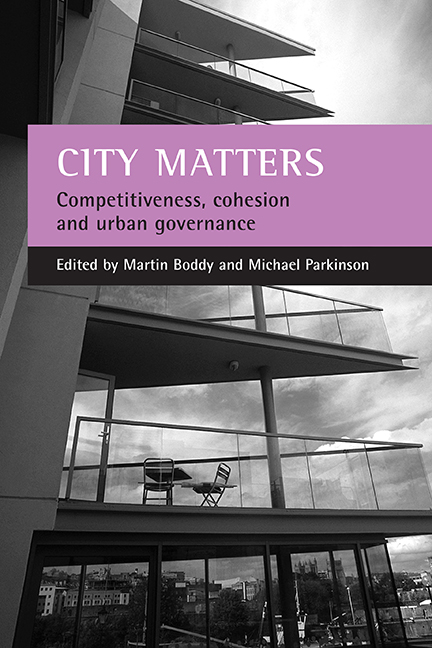Book contents
- Frontmatter
- Contents
- List of tables and figures
- Foreword
- Acknowledgements
- Notes on contributors
- one Introduction
- Part One Competitiveness, cohesion and urban governance
- Part Two Competitiveness and urban change
- Part Three Competitiveness, innovation and the knowledge economy
- Part Four Housing, property and economic performance
- Part Five Space, place and social cohesion
- Part Six Ethnicity, enterprise and social cohesion
- Part Seven Leadership, governance and social capital
- Conclusions
- Index
three - Reinventing cities in a restructuring region? The rhetoric and reality of renaissance in Liverpool and Manchester
Published online by Cambridge University Press: 20 January 2022
- Frontmatter
- Contents
- List of tables and figures
- Foreword
- Acknowledgements
- Notes on contributors
- one Introduction
- Part One Competitiveness, cohesion and urban governance
- Part Two Competitiveness and urban change
- Part Three Competitiveness, innovation and the knowledge economy
- Part Four Housing, property and economic performance
- Part Five Space, place and social cohesion
- Part Six Ethnicity, enterprise and social cohesion
- Part Seven Leadership, governance and social capital
- Conclusions
- Index
Summary
Governing urban change in England’s North West
The cities of Manchester and Liverpool in England’s North-West region have historically had a symbiotic, if fractious, relationship with each other that was critical to the UK’s early industrial ascendancy. Manchester was the key manufacturing centre, and Liverpool was the distributive hub providing a crucial link with the (colonial) trading world. By the closing decades of the 20th century, both were beset by the precipitous decline in ‘traditional’ industries that was typical of UK cities in crisis (Turok and Edge, 1999). In both cities, new political leaderships elected during the mid-1980s followed a course of practical and symbolic opposition to virtually every attempt by a Conservative national government to tackle its understanding of ‘the British disease’ (Parkinson, 1985; Harding, 2000). And yet, by the end of the 20th century, Liverpool and Manchester were popularly seen as divergent in both their development trajectories and the manner in which they were managed. On the one hand was Manchester, a now ‘pragmatic’ but still Labour-dominated city that has been seen as a paragon of renaissance and policy innovation by successive Conservative and Labour national administrations and which feels justified in proclaiming itself the de facto regional capital. On the other was Liverpool, a city that struggled to overcome the legacy of the militant-led, Trotskyite-influenced Labour administration of the mid-1980s and was beset by political indecision and lack of strategic direction. Arguably, as a result, it lost ground to its regional neighbour 30 miles along the M62 motorway.
The core objective of the Liverpool-Manchester Integrated Case Study (LMICS) was to assess the extent to which the effectiveness (or otherwise) of the structures and processes of urban governance had an independent impact, over time, upon the economic, social and environmental fortunes of the North West’s two principle metropolitan areas. While the study team remained resolutely sceptical about the anthropomorphic and heroic theory of history, which has it that cities can ‘pull themselves up by their own bootstraps’, this line of enquiry was useful in setting the context for the study. This was the case, not least, because the conventional wisdom about the development trajectories of the two cities over the last two decades strongly suggests that ‘governance makes a difference’.
- Type
- Chapter
- Information
- City MattersCompetitiveness, Cohesion and Urban Governance, pp. 33 - 50Publisher: Bristol University PressPrint publication year: 2004



